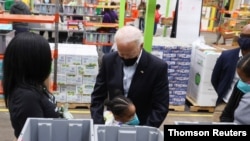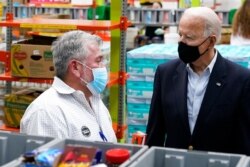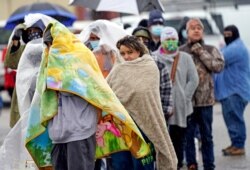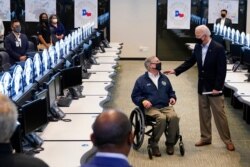U.S. President Joe Biden visited the state of Texas to survey the extensive damage caused by a severe winter storm that triggered power outages and the loss of drinking water to millions of homes during the coronavirus pandemic.
Biden and his wife, Jill Biden, on Friday visited a food bank, a health center and an emergency operations center in Houston, the largest city in the state.
At least 40 people in Texas were killed when the winter storm swept across southern U.S. states in mid-February. Texas was hardest hit by the unusually cold temperatures that triggered widespread power outages and caused water pipes to freeze and burst, flooding homes and leaving many without heat and drinkable water.
Temperatures in the region are returning to normal, but more than 1 million Texas residents are still under orders to boil water before drinking it.
Biden also visited a Federal Emergency Management Agency COVID-19 vaccination facility set up in a local stadium, where he warned that that coronavirus cases and hospitalizations could increase as new variants emerge.
"It's not the time to relax," he said.
He encouraged people to get vaccinated against COVID-19 to help contain the pandemic that has killed more than 510,000 people in the United States, according to Johns Hopkins University, and said the vaccination effort will "be a great American achievement."
Biden’s trip to Texas was the president’s first visit to a disaster site since taking office nearly six weeks ago. As with the coronavirus pandemic, the federal disaster response in Texas poses an early test of Biden’s promise to work for all segments of American society and thereby unify the country.
Biden, a Democrat, was accompanied in Houston by Texas Gov. Greg Abbott, a Republican who initially did not recognize Biden's November presidential victory over Donald Trump.
The president has issued disaster declarations in 108 of the state’s 254 counties and signaled he may increase the number. Abbott asked Biden last week to issue disaster declarations in all counties.
The declarations authorize FEMA to provide funding for temporary housing and home repairs, and low interest loans for uninsured property losses. The action also frees up funding to help distressed individuals and businesses owners.
Biden’s deputy national security adviser, Elizabeth Sherwood-Randall, told reporters during the president’s flight to Texas on Air Force One that the state’s lack of energy regulation had hurt it during the storm.
"Texas has chosen not to make the kinds of decisions that would provide for the supplies that you would keep for an emergency, that is, to invest in a kind of resilience that other states, which are regulated, are required to invest in," she said.
The White House said before the trip that Biden would bring empathy and assurances of federal financial help to Texas but would refrain from lecturing about the perils of the state’s lack of regulation of its power grid.








